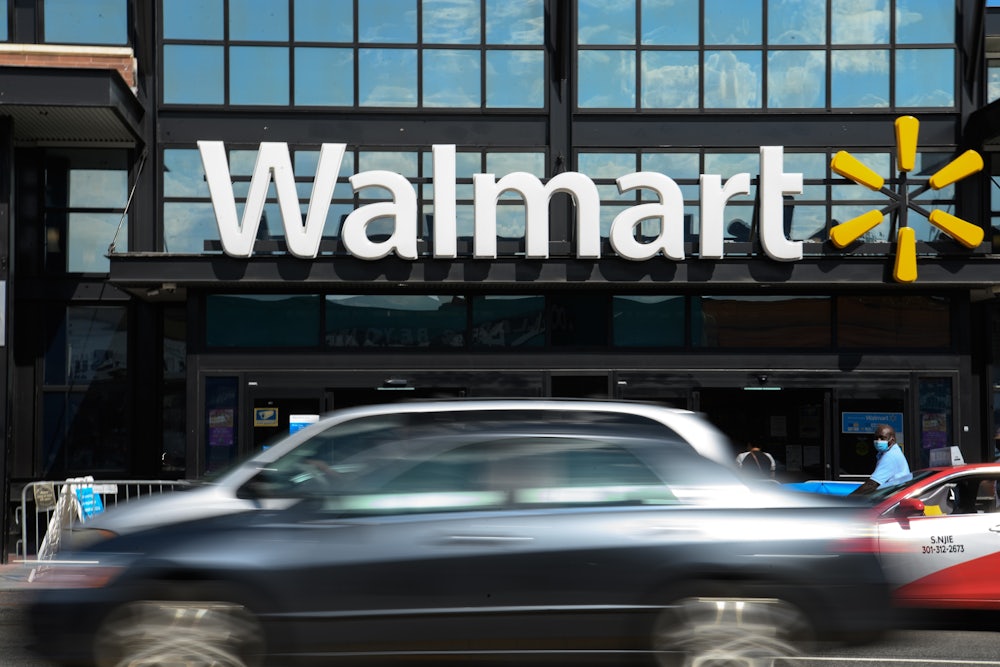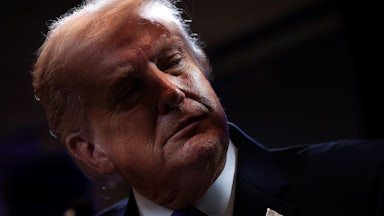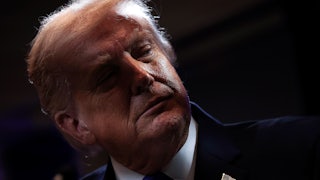The deal Walmart has inked with Novo Nordisk, which will allow it to sell the Danish drug manufacturer’s short-acting Novolog insulin for $75 a vial, is nothing short of revolutionary—that is, if you believe the press release the retail Goliath released at the end of June, announcing the arrangement. Several news outlets more or less echoed these sentiments, noting that the price amounted to a discount of up to 75 percent off the typical $300 list price of a life-sustaining drug whose skyrocketing costs have been explicitly tied to multiple deaths in recent years. As the Good News Network put it, “Walmart is seeking to bring ‘everyday low prices’ to medical care.”
And it’s not exactly wrong—while $75 isn’t cheap, it’s significantly less than what a patient paying full freight would shell out at most other pharmacies. But if you’re skeptical that these two multibillion-dollar corporations were suddenly moved by altruism, your doubts are warranted. Far from solving the insulin pricing crisis, this development merely sheds some light on the cracks in the health care system—as well as Walmart’s growing role in monetizing them.
In recent years, insulin has emerged as the popular media’s poster child for pharmaceutical price gouging. Though the formulation of the two major products manufactured by Eli Lilly and Novo Nordisk has remained unchanged since the 1990s, their prices have soared by over 1,100 percent. Much of the sticker shock, pharmaceutical companies and their sycophants whine, is thanks to pharmaceutical benefits managers, or PBMs, whom insurance companies contract to handle their drug benefits and who negotiate to receive rebates directly from drug manufacturers. The higher cost, pharma argues, doesn’t represent what most patients actually pay at the pharmacy register, once things go through their insurance. Of course, not everyone in the United States has insurance—and rising numbers of those who do have sky-high deductibles, which they must pay down before their plans cover anything. That inevitably means that a certain number of diabetes patients pay full freight.
None of this is particularly unusual: Patients get bilked for prescription meds all the time in America, and millions of them skip necessary drugs and care due to their high cost. Many will face serious health consequences as a result. But insulin’s capacity to impose almost immediate disaster makes it unique among medications. While a patient who can’t afford blood pressure medication may eventually have a heart attack, a patient deprived of insulin for mere hours can land in the E.R. Insulin-dependent patients require uninterrupted, constant access to the drug just to survive. This is no easy feat in the U.S., where our health care financing system forces patients to navigate Byzantine bureaucracies, shuffles them between plans due to changes in income or employment, or leaves them stranded without coverage at all.
High-profile tragedies like the death of 26-year-old Alec Smith—who died in his apartment surrounded by empty insulin pens in 2017 just days before his next paycheck—have galvanized politicians and the broader public like few other health care horror stories in recent memory.* But lawmakers have struggled to meaningfully address the problem: Several states have capped insurance co-pays in plans they regulate; tweaks in Medicare have assuaged the problem for its beneficiaries. Individual physicians have filtered more patients toward safety-net pharmacies offering steep discounts.
But none of those measures can fully account for just how many emergencies can arise among millions of patients with urgent medical needs in a patchwork system, and that’s where Walmart comes in. The retail giant famously already sells outdated insulin for $25 a vial. While it’s not safe to switch between modern and old insulin—people have died while getting used to the different dosing—it’s still alarmingly common; one study found that nearly 18,000 vials of past-its-prime insulin are sold daily in the U.S.
For Novo’s part, the much ballyhooed Walmart deal highlights the extent to which its “but we can’t lower our prices!” excuses up to this point have been utter bunk. Of course it could have offered a discount all this while; it’s now delivered one, in a way that it likely hopes precludes further regulatory scrutiny.
With a cash-only price of $75 a vial for analog insulin, Walmart is clearly gunning for a very specific market: the patients falling through the cracks, who might have put off filling any other prescription but this one. Walmart has realized there is value in cornering a cash-only insulin market for those who would otherwise have no choice but to pay the $300 list price—patients with insurance gaps, whose deductible just started over, who forgot to settle their insurer’s prior authorization and need a refill late on Friday, or who accidentally damage the vial for which their plan already paid.
Of course, $75 is more than most co-pay caps, and it’s too much to be a realistic permanent option for most patients, who need up to three vials a month for the rest of their lives. But by being the cheapest last resort for patients who desperately need one, Walmart will make plenty of money off the things that are so broken about the American health care system. It’s a role the retail chain already has experience monetizing, with several of its locations offering cash-only doctors’ visits in places with little access to primary care, and an ever-growing line of in-house branded diabetes products likely to be used by its disproportionately poor and rural shoppers at higher risk for the disease.
Walmart’s offerings may benefit certain individual patients who need them. But it’s impossible not to be disturbed when one of the world’s most powerful for-profit companies deepens its vested interest in keeping the cracks in our health care system wide enough to fall through. There may even be lawmakers (especially those whose nests are feathered by Walmart and Novo) who will hail this arrangement as the solution to a shameful problem and shrug off any obligation to offer further fixes. A world where a $75 vial of insulin is hailed as a life raft is exactly what corporations like Walmart and Novo Nordisk want. The rest of us deserve better.
* This article originally misstated Alec Smith’s age.








